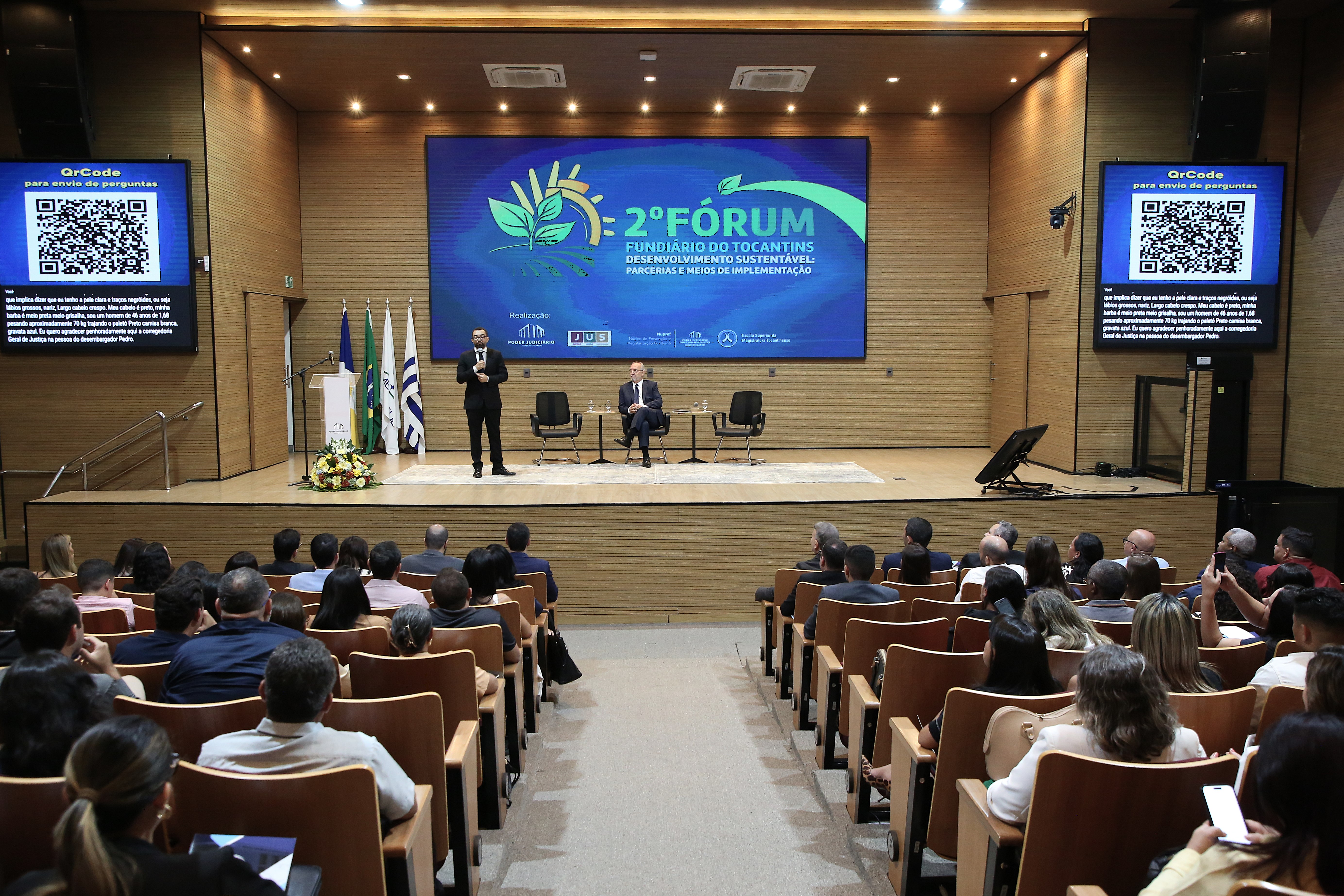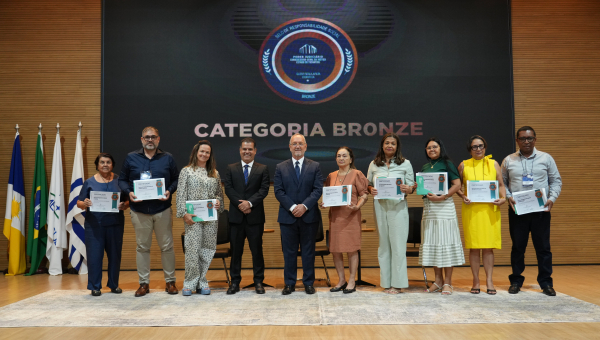
The morning of this Friday (August 29th) was marked by practical reflections at the 2nd Land Forum of the state of Tocantins: Sustainable Development: Partnerships and Means of Implementation, held in the auditorium of the Court of Justice of the State of Tocantins (TJTO), in the city of Palmas. The event, promoted by Esmat and coordinated by the Center for Prevention and Land Regularization (Nupref), began with the opening ceremony and quickly brought to the center of the debate the great challenges of land governance in the State.
The first panel brought to the discussion the social and economic relevance of land regularization, with an exhibition by the registrar Fábio Roque da Silva Araújo and a debate led by Justice Pedro Nelson de Miranda Coutinho, general chief of Justice. The dialogue advanced to central concepts of the area, highlighting the need to understand the different types of regularization and their impacts on the lives of people.
"This moment is very important for the dissemination of these two practices and for us to be an instrument of modification of citizenship in the state of Tocantins," said the magistrate, highlighting the importance of the Forum as a space for debate and collective construction.
Subsequently, Panel 2 addressed the implications of the Provision 195 of 2025 on land regularization procedures. The exhibition of Rachel Barbosa Lopes Cavalcante Tirello, official and president of Anoreg/ TO, had the critical look of debaters Tiago Junqueira de Almeida and Vagmo Pereira Batista, who brought experiences from different regions of the state of Tocantins. "Regularizing is also instituting public policies, whether in the environmental issue or in the construction of a school," said Rachel Barbosa.
Closing the morning programming, Case Study 1 presented the advances and obstacles faced in the city of Paraíso do Tocantins. Andressa Coelho Barbosa Cabral, municipal prosecutor of Paraíso, highlighted achievements obtained in the regularization process, while the debaters Camilla Araújo Matos, civil server of the TJTO, and Fernando de Souza Amorim, official registrar of the Civil Registry Service of Natural Persons Interdictions and Guardianship of the city of Palmas/ TO, stressed the importance of integration between public authorities and notary offices.
"I really believe that Land Regularization can transform lives and can help make our cities more sustainable, less unequal, fairer and equitable," said Camilla Araújo.
Afternoon programming
Panel 3 of the II Land Forum of the state of Tocantins, entitled on "Guaranteeing Access: The Gratuity of Fees before Land Regularization", brought together experts to discuss the importance of gratuitousness in registration acts and the challenges in implementing the Urban Land Regularization (Reurb).
The panel was led by Ana Cristina Maia, official registrar of the Real Estate Registry of the city of Mariana (MG) and director of Land Regularization of the Brazilian Property Registry, with mediation of Judge Jordan Jardim, coordinator of the Center for Prevention and Land Regularization (Nupref) of the Court of Justice of the State of Tocantins (TJTO).
Ana Cristina Maia stressed that urban land regularization is essential to guarantee fundamental rights, such as housing, property and work, and that the formalization of property has proven social and economic impacts. Studies indicate that families whose properties have been regularized have seen an increase in per capita household income, a reduction in child labor and a greater legal certainty.
Law no 13.465, of 2017, provides for two modalities of Reurb: Reurb-S, aimed at the low-income population, and Reurb-E, directed to other cases. The legislation exempts costs and fees and the acts of registration of Reurb-S, ensuring more access to regularization, and it determines that States create funds to offset costs, such as the Special Fund for Compensation of Social Interest Land Regularization (FEURB), created in the state of Bahia.
When addressing the importance of registration in the process, Ana Cristina highlighted that the final stage of regularization is crucial to change possession into formalized property, "Land regularization is only completed when it is registered. Registration is not only a bureaucratic procedure, but also the materialization of a right. It is a fundamental step to include the population in the formal system of property and to move forward in building a fairer and more egalitarian society", she said.
Then, Case Study 2 was presented, with the theme on "Main Obstacles in the Elaboration of Land Regularization Projects: Diagnosis, Surveys and Notifications". The exhibition was led by Josiene Soares Guimarães, municipal server responsible for Reurb in the city of Dianópolis, and mediated by Marcela Moura Costa, official substitute of the Real Estate Registry Service of the city of Palmas.
Josiene highlighted that the land regularization process faces challenges ranging from complex technical surveys to legal, tax and infrastructure issues. "The process of Reurb involves from complex technical surveys to notifications of all interested, and the necessary infrastructure must be deployed in order to ensure that the right to housing is fully ensured," she said.




_thumbnail_thumbnail_thumbnail.jpg)

_thumbnail_thumbnail.jpg)

